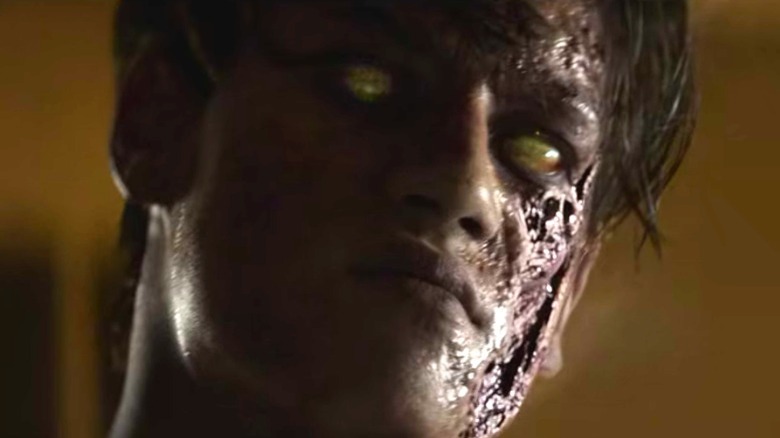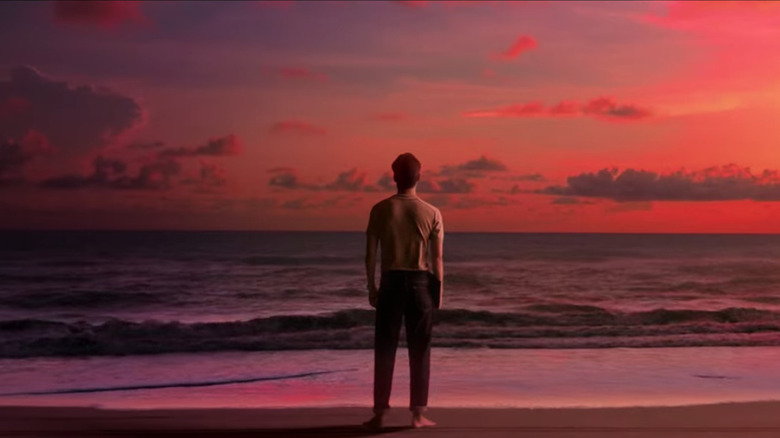The Ending Of Ghost Lab Explained
The following article discusses suicide, death, and sexual assault.
Released as a Netflix Original on May 26, 2021, the Thai horror film "Ghost Lab" follows Dr. Arjong "Gla" Soonyata (Paris Intarakomalyasut) and his colleague Dr. Cheewee "Wee" Prometheus (Thanapob Leeratanakachorn) in their quest to prove the existence of ghosts. After encountering the apparition of a deceased patient late one night, the two friends attempt to gather scientific evidence of the afterlife for publication.
Gla has been obsessed with the existence of spirits ever since he saw a vision of his late father as a child. Wee is far more skeptical, but is still committed to finding proof after seeing the spirit. Along the way, the pair encounter numerous supernatural incidents, but are unable to record any solid scientific evidence of their experiences.
Wee then proposes that for their research to have any chance of success, they need the participation of a cooperative spirit. Wee, who's already distraught over the recent death of his mother, volunteers to take his own life and return to Gla to continue their work from the other side. Despite Gla's protests, Wee prepares for his death, but ultimately does not take his own life. To his shock, Gla then nonchalantly states, "Don't worry, I'll be back" and sacrifices himself for the experiment.
Here's what happens in "Ghost Lab," how it ends, and what it all means.
If you or anyone you know is having suicidal thoughts, please call the National Suicide Prevention Lifeline at 1-800-273-TALK (8255).
Gla is willing to go to any lengths to find answers
Gla's all-consuming obsession with the afterlife is obvious from the very beginning of "Ghost Lab." Instead of fear, he expresses excitement upon encountering ghosts, and has been actively seeking them out for years. We see numerous examples of how his preoccupation with the dead overshadows Gla's concern for the living. He almost kills a patient by going into surgery exhausted after a night of ghost-hunting, he schemes to make a terminal woman fall in love with him in hopes that her spirit will haunt him, and his own death is an act meant to legitimize his research ambitions. When trying to convince Wee not to take his life, Gla doesn't offer his own out of concern for his friend; he does it because he wants to be the one who gains knowledge from the other side, exclaiming, "It's my f***ing right!"
Blind to the anguish his actions will cause his loved ones, Gla is singular in his goal and constantly chasing the adrenaline rush of otherworldly encounters. His motivations are plainly expressed when he states, "The door to the secrets of the universe is right in front of us. Nothing will stop me from trying to open it." And as it turns out, nothing does.
If you or anyone you know is having suicidal thoughts, please call the National Suicide Prevention Lifeline at 1-800-273-TALK (8255).
After Gla's death, Wee is consumed by their research of the paranormal
Although Wee is devoted to the research he and Gla are doing, he initially doesn't compromise his personal relationships or ethics for his goals. It's the grief over his mother's death and not an infatuation with the paranormal that ultimately motivates him to suggest dying by suicide. Even when making this decision, Wee considers that no one would mourn him, he would be able to fulfill Gla's lifelong research, and he would get a chance to see his mother again. It isn't until he watches Gla take his life that Wee's interests in the paranormal become obsessive and unscrupulous.
From this point on, Wee's fixation mirrors Gla's as their experimentation repeatedly compels him to compromise his ethics. After making contact with Gla's spirit, he discovers that strong emotional responses increase the ghost's abilities. Wee then goes about antagonizing Gla's grieving family, and even sexually assaults his girlfriend Mai (Nuttanicha Dungwattanawanich) in the name of science. Given the disregard Gla had for them while he was alive, to Wee, this behavior is in line with his friend's previous actions — putting his research above literally everything else.
For Wee, completing their work at any cost is imperative because otherwise his friend's death would be meaningless. He rationalizes that only by achieving their goals does all their pain and suffering serve a greater purpose — otherwise, it would just be meaningless agony.
If you or anyone you know is having suicidal thoughts, please call the National Suicide Prevention Lifeline at 1-800-273-TALK (8255).
If you or anyone you know has been a victim of sexual assault, help is available. Visit the Rape, Abuse & Incest National Network website or contact RAINN's National Helpline at 1-800-656-HOPE (4673).
Some questions can never be answered
There are some things in life that have no concrete answers, like death. "Ghost Lab" demonstrates this throughout its narrative and especially in its conclusion.
Even after Gla becomes a ghost, Wee isn't able to gather any tangible evidence for their research. Gla himself says that though he's now a spirit, he doesn't have any deeper understanding of the afterlife. It's only when Gla sees the agony of grief his loved ones are enduring that he finally realizes what he gave up in his search for unanswerable questions. While alive, Gla prioritized his obsessive fixation on the deceased above everything else, including his own survival. After death, he gains perspective and realizes that a person's final destination is far less important than the journey they take to get there.
Although Wee's research is ultimately rejected, he also realizes that the experiences of existence itself is how we derive meaning and purpose. Whether painful or not, as long as we're able to learn something through life's circumstances and grow from those ordeals, they are never meaningless.
If you or anyone you know is having suicidal thoughts, please call the National Suicide Prevention Lifeline at 1-800-273-TALK (8255).



